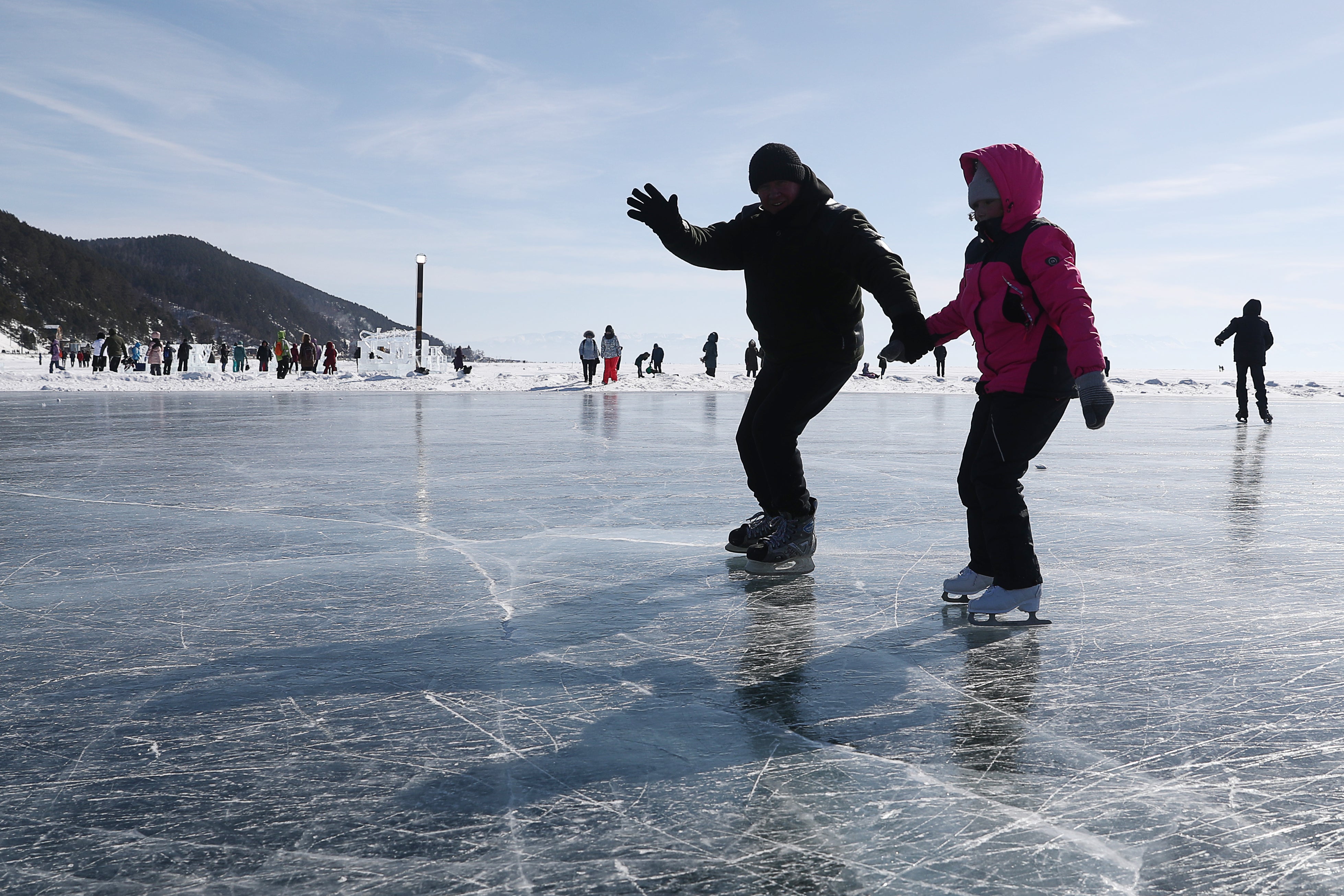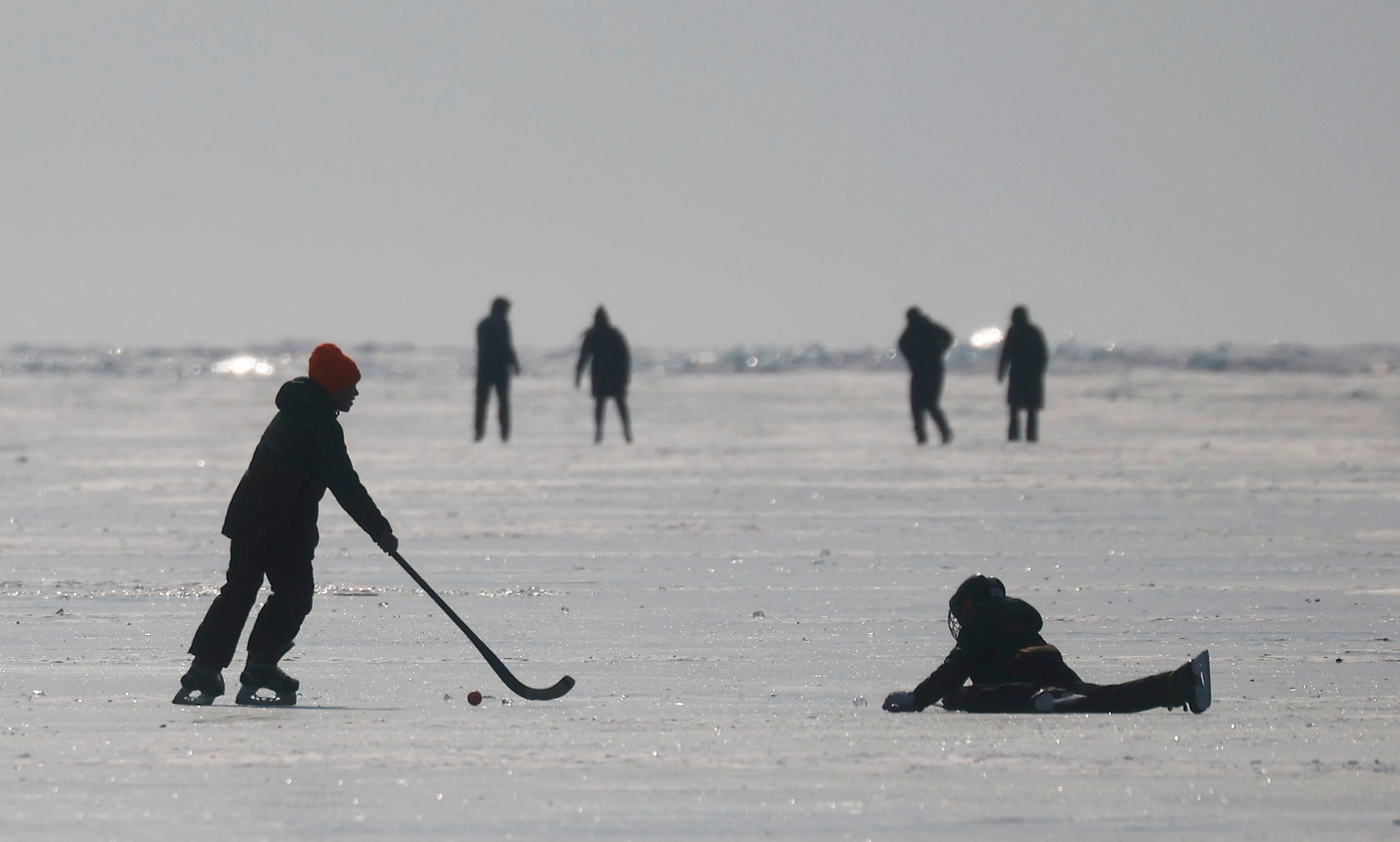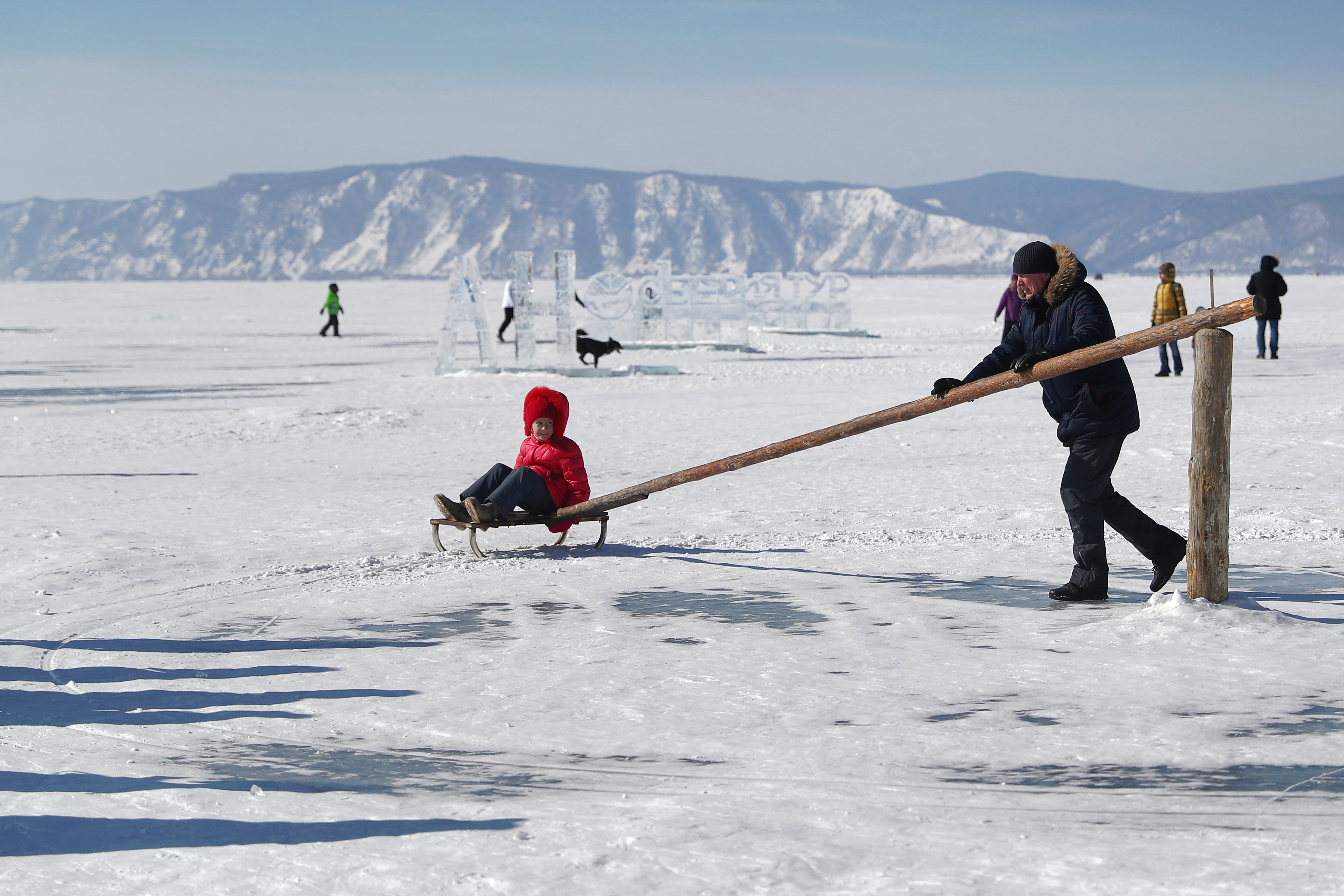World’s deepest lake in Siberia has become a place to be seen for Russians
With Russia’s borders still closed, the world’s deepest lake will have to make do with home visitors for now, write Anton Troianovski and Sergey Ponomarev

She drove 2,000 miles for this moment: hanging out the sunroof of her white Lexus SUV that glittered under the blinding sun, face to smartphone selfie camera, bass thumping, tires screeching, cutting doughnuts over the blue-black, white-veined ice.
“It’s for Instagram and TikTok,” says Gulnara Mikhailova, who drove two days and two nights to get to Lake Baikal with four friends from the remote Siberian city of Yakutsk.
It’s about zero degrees Fahrenheit (-18C) as Mikhailova, who works in real estate, puts on a swimsuit, climbs up onto the roof of her car and, reclining, poses for pictures.
This is winter on the world’s deepest lake, 2021 Pandemic Edition.
Read More:
The tour guides are calling it Russian Season. Usually, it is foreigners – many from nearby China – who flock to Siberia’s Lake Baikal this time of year to skate, bike, hike, run, drive, hover and ski over a stark expanse of ice and snow, while Russians escape the cold to Turkey or Thailand.
But Russia’s borders are still closed because of the pandemic, and to the surprise of locals, crowds of Russian tourists have traded tropical beaches for Baikal’s icicle-draped shores.
“This season is like no other – no one expected there to be such a crush, such a tourist boom,” says Yulia Mushinskaya, director of the history museum on the popular Baikal island of Olkhon.
People who work with tourists, she says, “are just in shock”.
If you catch a moment of stillness on the crescent-shaped, 400-mile-long, mile-deep lake, the assault on the senses is otherworldly. You stand on 3 feet of ice so solid it is crossed safely by heavy trucks, but you feel fragile, fleeting and small.
The silence around you is interrupted every few seconds by the cracking underneath – groans, bangs and weird, techno-music twangs. Look down, and the imperfections of the glass-clear ice emerge as pale, shimmering curtains.
Yet stillness is hard to come by.
While western governments have been discouraging travel during the pandemic, in Russia, as is so often the case, things are different. The Kremlin has turned coronavirus-related border closures into an opportunity to get Russians – who have spent the last 30 years exploring the world beyond the former Iron Curtain – hooked on vacationing at home.
One said he was thrilled by the landscape but shocked by the region’s poverty
A state-funded program begun last August offers £200 refunds on domestic leisure trips, including flights and hotel stays. It is one example of how Russia, which had one of the world’s highest coronavirus death tolls last year, has often prioritised the economy over public health during the pandemic.
“Our people are used to travelling abroad to a significant degree,” President Vladimir Putin said in December. “Developing domestic tourism is no less important.”
Recent months have seen a monumental crush of tourists at Black Sea beaches and Caucasus ski resorts. This winter, during what some call the “gender holiday” travel period around Defender of the Fatherland Day on 23 February (when Russia celebrates men) and 8 March (International Women’s Day), Lake Baikal has been the place to be.
It is a distillation of tourism in the Instagram age.
Some visitors bring their own smartphone tripods, jumping up and down repeatedly for the perfect snapshot of themselves in midair before a wall of ice. Others pilot drones or set off bright-coloured smoke bombs.
At sunset recently, a line of tourists lay on the frozen lake on their bellies inside a natural grotto in the shoreline cliffs, taking pictures of the rose-glinting icicles hanging from the ceiling.
“Get out!” some yelled when another group arrived. “Take a hike, all of you! You’re blocking the sun!”

“The social networks have led to all this,” says a guide at the grotto, Elvira Dorzhiyeva. “There’s these top locations, and it’s like – ‘All I care about is that I want what I saw online’.”
The most in-demand photos involve the clear ice, so some guides carry brushes to sweep away the snow.
Nikita Bencharov, who learned English competing in international table tennis tournaments in the Soviet era, runs a sprawling hotel complex on Olkhon and estimates that in a normal year, more than 70 per cent of the wintertime visitors are foreigners.
This year, just about all his guests are Russian, which has presented a bit of a problem. Russians who vacation abroad are used to cheap, comfortable lodgings, which are hard to find in the far reaches of their own country. At Olkhon hotels this season, unassuming double rooms have gone for as much as £150 a night; at some of the cafes, the restrooms are unheated outdoor pit toilets.
“The foreigners are already a bit prepared and thank the Lord that there’s a normal bed here, at least, and that they’re not sleeping on a bearskin,” Bencharov says. “They understand better than the Russians where they’re travelling to and why.”
Many operators geared toward foreign tourists have scrambled to adjust. On Olkhon, the once-Chinese restaurant now serves borscht.

At the island’s northern tip, where orange cliffs tower over a blue-white labyrinth of ice formations, fleets of tour vans deposit hundreds of people to slide and clamber around, and then to slurp fish soup heated by fires set directly on the ice.
A couple from Moscow, two engineers in their 30s, say they are visiting Siberia for the first time. One says he is thrilled by the landscape but shocked by the region’s poverty and feels sorry for the people and how they have to live.
About 50 miles away, at a fishing camp across the lake, three men bunk in a metal shack on the ice, the air inside tinged with the scent of cured fish, damp bedding and pine-nut moonshine in a plastic bottle on the floor. Two of the men, firefighters, say they made around £220 a month and took several weeks off in the fall to supplement their income by harvesting pine nuts in the forest.
“We make the minimum and complain and complain – and that’s it,” one of the firefighters, Andrei, 39, says. “And, what, we listen to Putin on TV …”
He lets his voice trail off, with a nervous laugh. He declines to give his last name, worried about retaliation at his government job.
Baikal’s alien landscape offers an escape from hardship and crisis – temporary and, perhaps, deceptive. The coronavirus, for one, seems not to exist, with not a mask in sight on the visitors packing tour vans and restaurants. Their dismissive attitude mirrored an independent poll this month that found that fewer than half of Russians worried about catching the virus and that only 30 per cent were interested in getting the Russian coronavirus vaccine.
Read More:
“It’s a psychosis,” a park ranger, Elena Zelenkina, says of the global fear of the virus as she serves tea and homemade doughnut holes at a gift shop next to hot springs on the lake’s quieter eastern shore.
A group of music aficionados in the nearby city of Irkutsk even went ahead with their annual indoor winter music festival. One of the spectators, Artyom Nazarov, is from Belarus – one of the few countries whose nationals can now easily enter Russia.
Belarus, like Russia, has been wracked by anti-government protests. But like Putin, President Alexander Lukashenko of Belarus has held on, deploying an overwhelming show of force to put down unrest. Nazarov says he had supported the protesters but because it seemed their victory is neither imminent nor assured, he is moving on.
He has spent an exhilarating week walking and skating around Olkhon. He is looking forward to more outdoor tourism, on Russia’s Kamchatka peninsula or in Iceland if the borders open.
“We all have our dreams and our goals that we want to achieve,” Nazarov says. “Life goes on.”
© The New York Times
Join our commenting forum
Join thought-provoking conversations, follow other Independent readers and see their replies
Comments
Bookmark popover
Removed from bookmarks